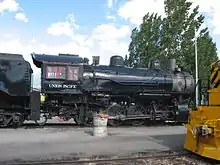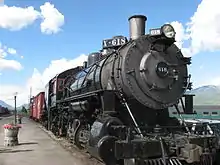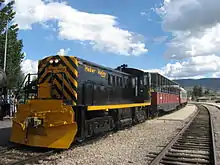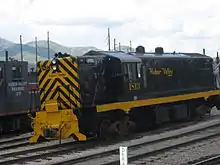Heber Valley Railroad
The Heber Valley Railroad (HVRX) is a heritage railroad based in Heber City, Utah. It operates passenger excursion trains along a line between Heber City and Vivian Park, which is located in Provo Canyon. The HVRX carries over 110,000 passengers a year.[1]
| Heber Valley Railroad | |
|---|---|
 | |
| Locale | Heber City, Utah |
| Terminus | Vivian Park, Utah |
| Coordinates | 40°30′8.06″N 111°25′28.14″W |
| Connections | None |
| Commercial operations | |
| Name | Provo Canyon Branch of the Denver and Rio Grande Western Railroad |
| Built by | Rio Grande Western & Utah Eastern Railway |
| Preserved operations | |
| Operated by | Heber Valley Historic Railroad Authority |
| Reporting mark | HVRX |
| Commercial history | |
| Opened | 1899 |
| Closed | 1967 |
| 1992 | Operation as Heber Valley Railroad begins. |
| Website | |
| http://www.hebervalleyrr.org/ | |
The railroad line is approximately 16 miles (26 km) long. A typical round trip ride on the train takes about 3 hours. There are a total of four passing sidings outside of the Heber yard limit. Notable landmarks seen from the train include Mount Timpanogos, Cascade Mountain, Deer Creek Dam and Reservoir, Provo River, Sundance Ski Resort, Tate Barn, and Soldier Hollow. A variety of wildlife including deer, eagles, fox, moose, turkeys, hawks, mountain lions (cougars), and beavers, have all been seen from the train as well.
Equipment
The Heber Valley Railroad has two 1907 Baldwin 2-8-0 Consolidation-type steam locomotives: former Union Pacific No. 618 and ex-Great Western No. 75, although they are both out of service pending completion of their 1,472 day inspections and service. Also on display is former Columbia Steel Company 0-6-0 No. 300 built by Baldwin in the 1920s.
The HVRX is home to four EMD diesel-electric locomotives: Ex-Union Pacific EMD NW2 No. 1011, Ex-Union Pacific EMD NW2 No. 1043, Ex-Union Pacific EMD GP-9 No. 296, and Ex-USATC EMD MRS-1 No. 1813. As well as Ex-United States Army Transportation Corps Baldwin (rebuilt with a Caterpillar prime mover) RS-4-TC-1 number 4028. It also has a former United States Army Davenport 44-ton diesel-electric locomotive No. 1218, which is very similar to a GE 44-ton switcher. In 2018, the railroad purchased 3 GP9's which are numbers 52, 72, and 77 from New England's Pan Am Railway. With the arrival of the GP9s, the Heber Valley’s former U.S. Army MRS-1 will be retired.[2] In 2019 the railroad purchased the National Railway Historical Society British Columbia chapter collection including a former VIA FP9ARM #6300 that arrived in December 2019.
History
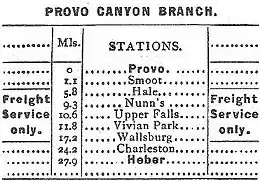
The line operated by the HVRX was formerly part of a Denver and Rio Grande Western Railroad branch line that connected Heber City to Provo, Utah. The branch line was completed in 1899 and operated freight and passenger service until the line's abandonment in 1967.
The line was saved for tourist use and was reopened in 1970 when No. 618 and other equipment was brought up the line from Provo. The track between Provo and Vivian Park was later removed and converted into a recreational trail. During the 1970s and 1980s the railroad operated as the "Heber Creeper". In the late 1980s this railroad went out of business.
Citizens in the Heber area successfully petitioned the State of Utah to help save the railroad, leading to creation of the Heber Valley Historic Railroad Authority in the early 1990s. Since this time the railroad has seen considerable growth. The railroad operates as a non-profit 501(c)(3) organization.
During the 2002 Winter Olympics the railroad was part of the Olympic Steam Team, carrying spectators to the Soldier Hollow Olympic venue. The railroad's No. 618 and 75 steam-engines, were joined by the Nevada Northern Railway Museum's No. 93 steam-engine, in pulling eight-car trains full of passengers, to the Soldier Hollow depot where they disembarked and continued to the venue entrance on a horse-drawn sleigh.[3] The day prior to the Opening Ceremony of the games, all three locomotives were combined into one triple-headed train, and used to transport the Olympic flame from Soldier Hollow to Heber City as part of the torch relay.[4]
Current operations
The railroad's main depot is located in Heber City. Other passenger terminals are located at Soldier Hollow (near Midway, Utah) and Vivian Park. The railroad operates year-round, and features special event and evening train rides.[5] Among its named trains are the Provo Canyon Limited, a three-hour round trip excursion to Vivian Park and the shorter Deer Creek Express to Deer Creek Reservoir.[5] The railroad can be seen from various points along U.S. Highway 189 between Heber City and Vivian Park and the whistle can be heard throughout the valley.
Locomotive No. 618 was used in the 2006 film, Outlaw Trail: The Treasure of Butch Cassidy.[6] The locomotive, 100 years old as of July, 2007. From 2008-2010 618 ran limited capacity and was then taken out of service for a 1,472-day inspection and major overhaul, as required to meet Federal Railroad Administration (FRA) safety standards in 2010. The non-profit railroad raised the $750,000 required for the project to give #618 another 30 years of service. Its restoration, including conversion from coal to oil burning, is expected to be completed in 2021.[1] #75 has been out of service undergoing restoration since 2003.
Gallery
See also
- List of heritage railroads in the United States
- Wilmington & Western Railroad for pages on boiler rehabilitation
References
- Wrinn, Jim (February 5, 2019). "No steam at Heber Valley in 2019". Trains magazine. Retrieved 2019-02-12.
- Franz, Justin (May 17, 2018). "Heber Valley purchases Pan Am GP9s". Trains magazine. Retrieved 2019-02-12.
- Salt Lake Organizing Committee (2001). Official Spectator Guide. p. 211.
- Keith Albrandt (2002). "Salt Lake City 2002 XIX Olympic Winter Games Steam Team". Nevada Northern & Railroads of White Pine County website. Archived from the original on 20 April 2011. Retrieved 7 January 2011.
- Wrinn, Jim, ed. (2009). Tourist Trains Guidebook. Waukesha, Wisc.: Kalmbach Publishing. p. 232. ISBN 978-0-87116-273-1.
- Outlaw Trail: The Treasure of Butch Cassidy (DVD). Feature Films for Families. 2007.
External links
| Wikimedia Commons has media related to Heber Valley Railroad. |
- Heber Valley Railroad Home Page
- Heber City Official City Site
- Historic American Engineering Record (HAER) No. UT-63, "Heber Creeper Railroad Line, Following course of Provo River, between Provo & Heber City, Provo, Utah County, UT", 2 photos, 24 data pages, 1 photo caption page
- HAER No. UT-63-A, "Heber Creeper Railroad Line, Section from Bridal Veil Falls to Vivian Park, Between Provo & Heber City", 19 photos, 4 data pages, 2 photo caption pages
- HAER No. UT-63-B, "Vivian Park Bridge, Spanning South Fork of Provo River", 4 photos, 4 data pages, 1 photo caption page
- HAER No. UT-63-C, "Olmstead Bridge, Spanning Provo River", 7 photos, 4 data pages, 1 photo caption page
